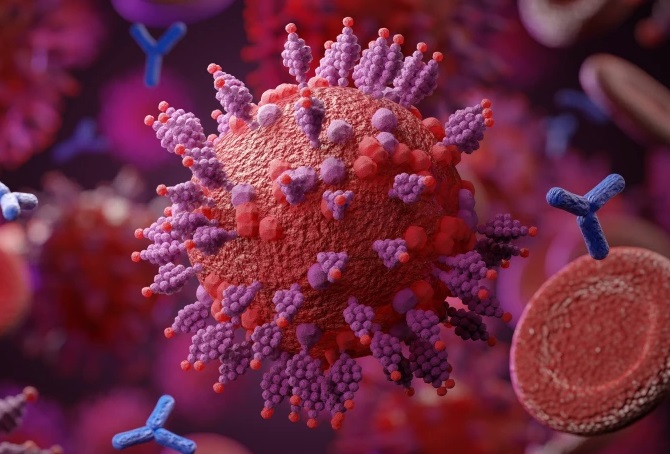Understanding the Immune Response to COVID-19 as a Potential Recall Reaction Susceptible to Immune Memory
Nikhil Prasad Fact checked by:Thailand Medical News Team Jan 24, 2025 10 months, 3 weeks, 3 days, 18 hours, 52 minutes ago
Medical News: A groundbreaking study has unveiled new insights into the immune response to COVID-19, shedding light on why some cases are more severe than others. Researchers from Vall d’Hebron Research Institute (VHIR), Hospital Universitari Vall d’Hebron, Universitat Autònoma de Barcelona, Bellvitge University Hospital, Germans Trias i Pujol Research Institute, and Erasmus University Medical Center collaborated on this important investigation. Their findings challenge current understandings of how the immune system responds to SARS-CoV-2, the virus responsible for COVID-19.
 Understanding the Immune Response to COVID-19 as a Potential Recall Reaction Susceptible to Immune Memory
Understanding the Immune Response to COVID-19 as a Potential Recall Reaction Susceptible to Immune Memory
The study’s findings suggest that the immune response to COVID-19 resembles a "recall" reaction rather than a typical response to a new infection. This
Medical News report delves into the study’s key discoveries and what they mean for the future of COVID-19 treatment and prevention.
What Is a Recall Immune Response?
In a typical immune response to a new virus, the body first produces Immunoglobulin M (IgM) antibodies, followed by Immunoglobulin G (IgG) and Immunoglobulin A (IgA). However, the researchers observed a different pattern in 94.2% of the COVID-19 patients studied. Instead of IgM appearing first, IgG and IgA dominated the response from the beginning, resembling a recall reaction.
This recall response occurs when the immune system relies on memory from past encounters with similar viruses, such as common cold coronaviruses (CCCoVs). While this might seem beneficial, it can also lead to immune imprinting, where pre-existing immunity interferes with an effective response to the new virus. This phenomenon is also known as "original antigenic sin."
Study Design and Methods
The study analyzed 191 COVID-19 patients during the second wave of the pandemic in Barcelona, Spain. Participants were grouped by disease severity: asymptomatic, mild, moderate, and severe. Blood samples were collected at three intervals: 0-7 days, 8-20 days, and 21-107 days after symptom onset. Researchers used advanced techniques such as spectral flow cytometry and transcriptomic profiling to investigate immune responses.
The findings were compared with 44 healthy blood donors, ensuring a robust control group. Additionally, the study’s prospective design allowed researchers to track changes in immune responses over time, providing unique insights into the progression of COVID-19.
Key Findings
-Antibody Patterns
One of the most striking discoveries was the lack of an IgM-dominant response. Instead, IgG and IgA antibodies targeting SARS-CoV-2 proteins, such as the spike (S) and nucleocapsid (NP) proteins, appeared almost immediately. This pattern was particularly evident in hospitalized patients with moderate to severe symptoms. The delayed IgM response to
the receptor-binding domain (RBD) of the spike protein suggested that naive B cells - cells responsible for producing new antibodies - were not immediately activated. Instead, memory B cells from past infections with related viruses took the lead.
-Cytokine Activity
Cytokines, signaling proteins that regulate immune responses, also showed unusual patterns. In severe cases, cytokines like IL-7 were elevated, possibly as a response to lymphopenia (low lymphocyte levels). Interestingly, IFN-γ, a cytokine linked to antiviral responses, negatively correlated with antibody levels in moderate patients. This suggests a complex interplay between immune signals and antibody production, further supporting the idea of a recall response.
-Plasmablasts and B Cells
The researchers observed a rapid increase in plasmablasts (antibody-producing cells) in moderate and severe patients. These cells peaked earlier and at higher levels compared to mild cases. The dominance of IgA plasmablasts early on suggested that the immune response originated in mucosal tissues, such as the respiratory tract, and was driven by memory B cells.
B cell subsets also displayed unique trajectories. Memory B cells specific to CCCoVs seemed to delay the activation of naive B cells, especially in severe cases. This delay could explain why severe cases often exhibit prolonged and heightened immune responses.
Implications of Immune Imprinting
Immune imprinting can have both protective and detrimental effects. On the one hand, cross-reactive memory B cells can provide a quick defense against SARS-CoV-2. On the other hand, they might prevent the activation of naive B cells capable of producing more specific antibodies. This could lead to a less effective immune response and contribute to the severity of COVID-19 in some patients.
Conclusions
The study provides compelling evidence that the immune response to COVID-19 often functions as a recall reaction. This has significant implications for understanding disease severity and developing effective treatments and vaccines. While the recall response might protect against mild cases, it could also predispose individuals to immune imprinting, complicating their ability to fight off the virus.
Importantly, the study highlights the need for personalized approaches to COVID-19 treatment. For example, therapies targeting specific immune pathways, such as cytokine modulation or boosting naive B cell activity, could help mitigate severe cases. The findings also underscore the importance of ongoing research into the long-term effects of immune imprinting and its impact on vaccine efficacy.
In conclusion, this research offers a nuanced view of the immune system’s role in COVID-19, emphasizing the complexity of immune responses and their implications for public health. As the world continues to navigate the pandemic, these insights will be invaluable in guiding future strategies for combating COVID-19.
The study findings were published in the peer-reviewed journal: Clinical Immunology.
https://www.sciencedirect.com/science/article/pii/S152166162500004X
For the latest COVID-19 News, keep on logging to Thailand
Medical News.
Read Also:
https://www.thailandmedical.news/news/cambridge-study-finds-that-sars-cov-2-omicron-infection-induces-immune-imprinting-even-prior-to-vaccination
https://www.thailandmedical.news/news/mit-study-shows-that-long-covid-neurological-issues-is-due-to-delayed-clearance-of-sar-cov-2-caused-by-immune-imprinting
https://www.thailandmedical.news/news/breaking-emerging-sars-cov-2-variants-are-learning-to-suppress-immune-responses-against-itself-and-original-strains-helps-via-negative-immune-imprinti
https://www.thailandmedical.news/articles/coronavirus
